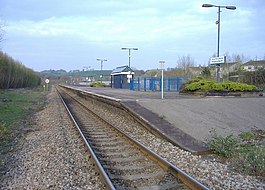Pontypool Road railway station
| Pontypool and New Inn |
|
|---|---|
| Welsh: Pont-y-pŵl a New Inn | |
 |
|
| Location | |
| Place | Pontypool |
| Local authority | Torfaen |
| Grid reference | SO300003 |
| Operations | |
| Station code | PPL |
| Managed by | Arriva Trains Wales |
| Number of platforms | 2 |
| DfT category | F1 |
| Live arrivals/departures, station information and onward connections from National Rail Enquiries |
|
| Annual rail passenger usage* | |
| 2012/13 |
|
| 2013/14 |
|
| 2014/15 |
|
| 2015/16 |
|
| 2016/17 |
|
| History | |
| Key dates | Opened 1852 |
| National Rail – UK railway stations | |
| * Annual estimated passenger usage based on sales of tickets in stated financial year(s) which end or originate at Pontypool and New Inn from Office of Rail and Road statistics. Methodology may vary year on year. | |
|
|
|
Coordinates: 51°41′51″N 3°00′48″W / 51.6974°N 3.0133°W
Pontypool and New Inn railway station (Welsh: Pont-y-pŵl a New Inn) is situated to the south east of Pontypool town centre between the town and the suburb of New Inn, Wales. The station was formerly called Pontypool Road until renamed just Pontypool in 1972 and then to the present name in 1994.
It is part of the British railway system owned by Network Rail and is managed by Arriva Trains Wales, who operate all trains serving it. It lies on the Welsh Marches Line from Newport to Crewe.
For almost 100 years from the mid 19th century to the early 1960s, Pontypool Road was an important station and key railway junction connecting to the main line from Newport to the Midlands and north of England (via Hereford) and branch lines to Neath and Merthyr. At its height, Pontypool Road featured a 50-line marshalling yard, engine sheds, goods sheds and refuelling facilities.
The burgeoning 18th-century iron industry in South Wales followed by the growth of coal mining industry in the 19th century required an extensive transport network. Initially canals were constructed such as the Brecon and Abergavenny Canal (opened 1812) which ran close to the southern part of Pontypool at Pontymoile. The rapid expansion of steam locomotion in the 1840s quickly saw the demise of the canals as the railways offered a faster and more economical transport system.
...
Wikipedia
